Consuming just one meal high in saturated fat can inhibit our ability to concentrate, reports a new study. The findings reveal a potential connection between high-fat diets and poor attention skills.

Their performance on the test was worse after eating the high-saturated-fat meal than after they ate the meal containing a healthier fat, signaling a link between that fatty food and the brain.
Researchers were also looking at whether a condition called leaky gut, which allows intestinal bacteria to enter the bloodstream, had any effect on concentration. Participants with leakier guts performed worse on the attention assessment no matter which meal they had eaten.
The loss of focus after a single meal was eye-opening for the researchers. "Most prior work looking at the causative effect of the diet has looked over a period of time. And this was just one meal - it's pretty remarkable that we saw a difference," said Annelise Madison, lead author of the study and a graduate student in clinical psychology at The Ohio State University.
Madison also noted that the meal made with sunflower oil, while low in saturated fat, still contained a lot of dietary fat.
"Because both meals were high-fat and potentially problematic, the high-saturated-fat meal's cognitive effect could be even greater if it were compared to a lower-fat meal," she said.
Advertisement
Women in the study completed a baseline assessment of their attention during a morning visit to the lab. The tool, called a continuous performance test, is a measure of sustained attention, concentration and reaction time based on 10 minutes of computer-based activities.
Advertisement
Five hours later, the women took a continuous performance test again. Between one and four weeks later, they repeated these steps, eating the opposite meal of what they had eaten on the first visit.
Researchers also analyzed participants' fasting baseline blood samples to determine whether they contained an inflammatory molecule that signals the presence of endotoxemia - the toxin that escapes from the intestines and enters the bloodstream when the gut barrier is compromised.
After eating the meal high in saturated fat, all of the participating women were, on average, 11 percent less able to detect target stimuli in the attention assessment. Concentration lapses were also apparent in the women with signs of leaky gut: Their response times were more erratic, and they were less able to sustain their attention during the 10-minute test.
"If the women had high levels of endotoxemia, it also wiped out the between-meal differences. They were performing poorly no matter what type of fat they ate," Madison said.
Though the study didn't determine what was going on in the brain, Madison said previous research has suggested that food high in saturated fat can drive up inflammation throughout the body, and possibly the brain. Fatty acids also can cross the blood-brain barrier.
"It could be that fatty acids are interacting with the brain directly. What it does show is the power of gut-related dysregulation," she said.
The statistical analysis accounted for other potential influences on cognition, including depressive symptoms and the participants' average dietary saturated fat consumption. The women in the study ate three standardized meals and fasted for 12 hours before each lab visit to reduce diet variations that could affect their physiological response to the high-fat meals.
The findings suggest concentration could be even more impaired in people stressed by the pandemic who are turning to fatty foods for comfort, Kiecolt-Glaser said.
"What we know is that when people are more anxious, a good subset of us will find high-saturated-fat food more enticing than broccoli," she said. "We know from other research that depression and anxiety can interfere with concentration and attention as well. When we add that on top of the high-fat meal, we could expect the real-world effects to be even larger."
Source-Eurekalert















